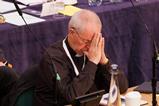Having a faith makes you happier. That's according to a new survey which says people of faith are on average 20 per cent more satisfied with life than atheists. Phil Knox looks at the implications

A few weeks ago I boarded the painfully early 6:26am train to London and stumbled sleepily into the on-train shop for a much needed injection of morning caffeine. It was there I made the mistake of asking the barista how she was doing. Her reply was a tsunami of pain, in which she managed to lament a list of woes from an achy foot to the threat of World War III. My response was sympathetically cheery, "We all need a bit of hope don’t we?!" As I walked away, purchased latte in hand, her words rang in my ears, "But there is no hope!"
As I talk to friends, neighbours, and occasionally baristas, I perceive more than ever a vacuum of hope. I can’t help but feel, as I read headlines of ever-increasing levels of anxiety and depression, that this hope deficit is contributing to a wellbeing crisis in our world. The Collins dictionary word of the year for 2022 was ‘Permacrisis’, defined as "an extended period of instability and insecurity, especially one resulting from a series of catastrophic events."
There’s an awful lot of bad news around.
And yet, as Christians, we are good news people in a bad news world. Surely this is our distinctive as those who carry light in the darkness?
Some new research suggests that faith is remarkably good for us. A study from the Institute for the Impact of Faith in Life has found that people of faith in Britain are significantly happier than atheists and non-religious people.
It reports that 73% of those who identify as religious say they have "good psychological wellbeing," compared to only 49% for atheists. 76% describe themselves as happy, compared to 52% for atheists. 69% say they are optimistic over their own future, compared to 42% of atheists.
In a secular age, where many decry religion as harmful to society, perhaps it is not so bad after all.
These findings should give us fresh confidence and encouragement in the value of being a follower of Jesus. When we know that we are loved by the creator of the universe, have meaning and purpose in the chaos of existence, a secure identity in a world of confusion, know forgiveness for our past, God’s presence with us each day and the assurance that everything will be ok in the end, it is not a shock that this leads to positive psychological wellbeing.
And yet another reason I am not surprised by the findings is the fact that people of faith tend to be part of a community of faith, and in an age of individualisation, the benefits of friendship and belonging matter more than ever.
I became captivated by friendship during a devastating 2020, at the peak of which my mum died of cancer. Two things sustained me through that tumultuous season: faith and friendship. We didn’t cook a meal for almost 3 months. We were so loved by our community of friends who provided for us. As I have researched and written on this subject I have found that studies consistently show the physical, mental and emotional benefits of friendship. It’s as if we were created to know and be known.
Over the coming years, I expect friendship and the invitation to belong to be prominent in almost every story of those who have come to faith
Dr Rakib Ehsan, the senior research associate and author of the report, acknowledges the connection, exhorting, "the sense of belonging and purpose that can be provided through religious and spiritual forms of attachment and membership should be better explored by policymakers." I wonder whether for us, as the UK Church, whatever we are doing to cultivate and facilitate friendship and community, we might increase our efforts and intentionality in this vital area.
The appeal of church family is also playing a significant role in how people become Christians at the moment. Last week I ended up sharing a taxi with a stranger. When he asked what I did, the conversation inevitably turned to faith. "I’m not religious", he said, "but I love the community aspect. I can see how that makes a difference to people." Over the coming years, I expect friendship and the invitation to belong to be prominent in almost every story of those who have come to faith.
Back on the train, I couldn’t shake the coffee-server’s decree that there was no hope and so nervously wrote her a note to try and brighten her day, telling my story of how Jesus had changed my life and explaining some of what brings light to my world. Her face lit up when I sheepishly explained and handed it across.
Psalm 103 encourages us to "forget not all his benefits." May we be reminded today how good it is to know our maker and may we bear that hope to a world that so desperately needs it at the moment. Because the secret of happiness, as well as eternal life, is not what you know, but who you know.







































1 Reader's comment